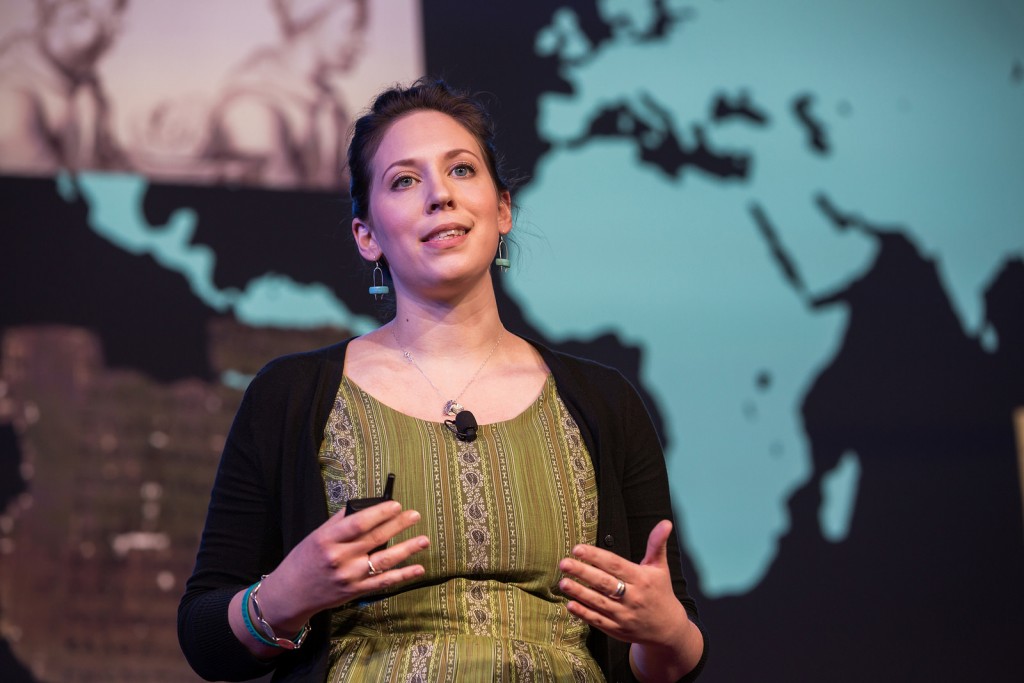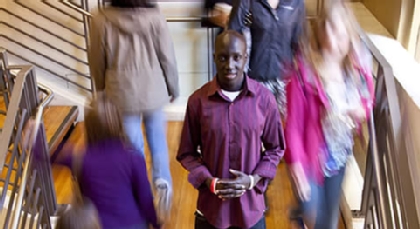Page 335 • (3,402 results in 0.181 seconds)
-

.” The organization offers a moral response to the ecological destruction that accompanies climate change’s threats, particularly to vulnerable, frontline, and marginalized communities, Schwartz says. “So much of climate change is driven by science and research, without putting people, community and culture at the forefront. There are human impacts of climate change that need to have their story heard and represented.” Schwartz notes that nearly 70% of Black people live or have lived within 30 miles
-
colorful fossils in stone than paintings of bugs in a book. Light glistens on the gold leaf, dancing around the illuminations with every slight pivot. The sparkling accents throughout the book represent the presence of the divine. Women and marginalized people can see their faces in the artwork. Science, anthropology, history, multiple faiths and more stand on equal ground, from the subtle use of DNA strands in the illuminations to the recurring use of Hebrew and Arabic text throughout the book. For
-
, PLU Bio: Marit Trelstad is Professor of Constructive and Lutheran Theology at Pacific Lutheran University in Tacoma, Washington. Her scholarly work combines feminist, process and Lutheran theologies and has focused on Christology, theological anthropology, the doctrine of God, and science and religion (including economics, geoengineering and ecology). As a contributor and editor, she published Cross Examinations: Readings on the Meaning of the Cross Today (Fortress, 2006) and contributed to
-
, PLU Bio: Marit Trelstad is Professor of Constructive and Lutheran Theology at Pacific Lutheran University in Tacoma, Washington. Her scholarly work combines feminist, process and Lutheran theologies and has focused on Christology, theological anthropology, the doctrine of God, and science and religion (including economics, geoengineering and ecology). As a contributor and editor, she published Cross Examinations: Readings on the Meaning of the Cross Today (Fortress, 2006) and contributed to
-
yearlong agenda expanded to an extended stay, during which she earned a degree in broadcast journalism with a minor in political science. In between academic years, Bjørhovde traveled home to work as a summer intern in Norwegian newsrooms. During her semesters at PLU, she was an active student journalist. “I value what I learned from writing for The Mast,” she said. “I value what I learned working in the TV studio.” She also had the opportunity to pick the brains of professional reporters, thanks to
-

in England, where she earned a master’s of science after blending her PLU degrees—and her life experience—into the emerging field of paleopathology: the study of disease, health, trauma and diet in human biology in ancient societies. “I want to look at evidence of cancer in archaeological remains, and add to a dataset that’s virtually nonexistent,” Hunt said. “At that point I wouldn’t have even called it a field—now it is, but a very, very small field.” A small field, maybe—but one with
-
two statements stood out for me: “Destiny is just an excuse for bad management,” Foege said in deploring those who believe the world’s current state of affairs is simply the consequence of some natural order. And after celebrating those who share in the excitement and optimism reflected in the new push for global health and development progress, he added a precautionary: “We had better know where we are going.” Tom Paulson ’81 has been a science and medical reporter at the Seattle Post
-

Lutheran University. This May, Akuien (pronounced “A – Q – En”) will graduate with a double major in communication and political science with minors in conflict resolution and religion. The first years of his life were spent traveling, or rather escaping from the horrors of a civil war in Sudan. “I was born into this chaos right away,” Akuien said. He is one of almost 4,000 “Lost Boys,” who escaped a life of war and faced the fear of the unknown for a chance at a better life in America. “Luckily, I was
-
Environmental Science, Policy & Management at UC-Berkeley returns to campus for a talk on environmentalism and sustainability. 7:30 p.m., Chris Knutzen Hall, Anderson University Center. Friday, April 24: DarkMatter workshop: The Revolution Will not Have a Bibliography: Student Activism in the Corporate University (3 p.m.) and #ItGetsBitter show (6 p.m.) Locations to be determined. Monday, April 27: Shared Hope: Eradicating Sex Trafficking. This dynamic program explores domestic sex trafficking and what you
-

PLU Associate Professor of Anthropology Bradford Andrews. One of those is an invaluable painting illustration that artistically has brought to life a market scene in the city of Calixtlahuaca, an important archaeological site for studying Mesoamerican urbanism in the Postclassic period (A.D. 1100-1520). Research at this archeology site has been conducted by the Calixtlahuaca Archaeological Project—supported by grants from the National Science Foundation and sponsored by Arizona State University—in
Do you have any feedback for us? If so, feel free to use our Feedback Form.


